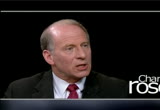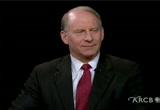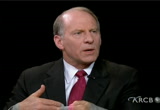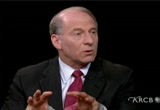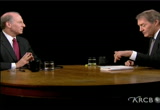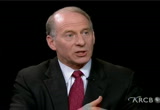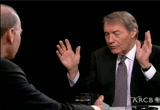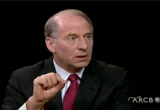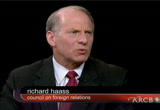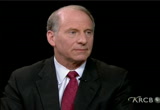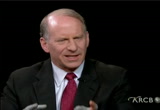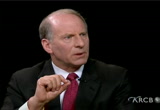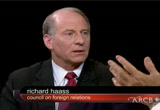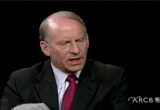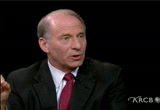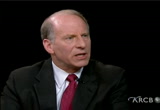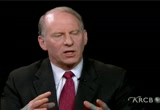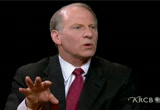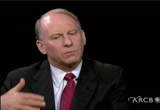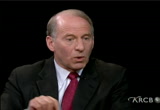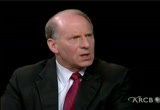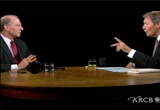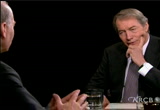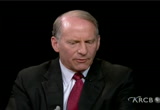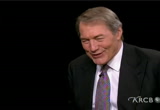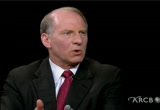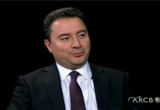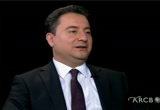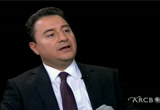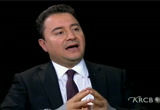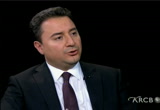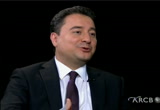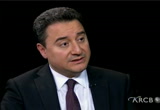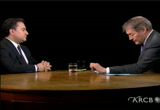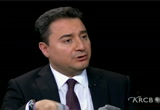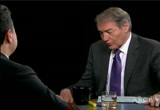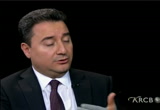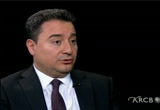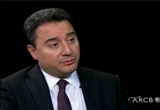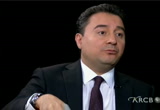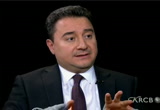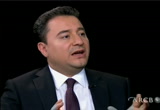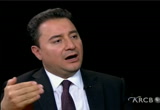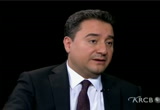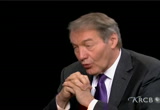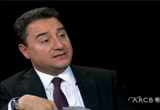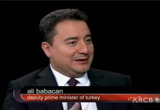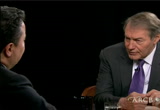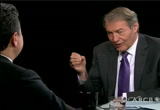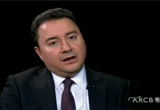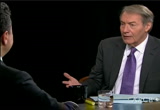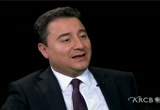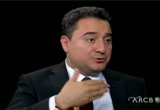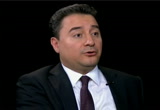tv Charlie Rose PBS April 29, 2013 11:00pm-12:01am PDT
11:00 pm
>> rose: welcome to the program, we begin this evening with richard haass, president of the council on foreign relations, he has a new book called foreign policy begins at home. >> and the problems of the administration is they want to rebalance toward asia, it is in the business literature there is always a conflict or tension between the urgent and the important an there is all of this urgent stuff coming from the middle east i am not saying it is important but there is truly important strategic stuff coming in asia and north america and at home and the challenge for the president is going to be to resist meof t pullf the urgent every kay every day and focus at home and focus in asia and get the balance right, that is what strategy is about. >> rose: we conclude this evening with ali babacan, he is the deputy prime minister of
11:01 pm
turkey. >> turkey and israel relations are very important for the whole region, because the region itself is going through a historical transformation process, like egypt, tunisia, yemen are trying to change, and also syria is in a very, very difficult situation. >> and the last thi that you would nt to see in the region is the turkish and israel relations getting worse. >> rose: american foreign policy, and turkish foreign policy when we continue. >> funding for charlie rose was provided by the following.
11:02 pm
>> rose: additional funding provided by these funders. n't and by bloomberg, a provider of multimedia news and information services worldwide. >> from our studios in new york city, this is charlie rose. >> rose: richard haass is here, she the president of the council on foreign relations. he is a veteran observer of american foreign policy in his new book he looks inward and argues america must solve its domestic problems if it is going to be a foreign power, it is foreign policy begins as home, the case for putting america's house in order. i am pleased to have him here at
11:03 pm
this table. welcome. tha you. >> rose: so where does this book come from? what have you been looking and, thinking that perhaps we need to focus on restoration? >> well, first of all it is a book i never imagined i would write just for that reason. >> rose: foreign policy expert talks about the need to get the economic house in order. >> right. the president of the council on foreign relations, i am a member of the card-carrying member of the foreign policy establishment. >> rose: yes you are. >> two things about me, charlie, one was i thought we were trying to do way too much abroad, particularly iraq and afghanistan. i simply thought the united states was trying to remake other societies arnd the world that would resist remaking our vital national interests, i just couldn't understand why it was we embarked on both of those nation building projects and secondly, here as home i thought we were underperforming, it was the mirror image, trying to do too much abroad and not as much as home, the fiscal debate, simpson-bowles went nowhere, any time you land at kennedy airport
11:04 pm
you get 101 course on our infrastructure and look at our schools, they are not doing it and didn't have immigration reform so it is this combination and back at home we simply were not dog tings to invest in our own future so we would have the re-- resources we could need in order to remain a great power throughout this century. >> rose: but this is not new argument a lot of people have made this argument, including the president, i think, in the speech he made at west point. >> the president has talk about nation building at home, he has done some of it but two things where i think he has wrong and there are places i think he already has it right for example this administration's decision to triple force levels in afghanistan, i simply disagreed with that, didn't see why we went, embarked on that road so i ought he was doing too much abroad and then here at home he was there at the birth of simpson-bowles commission to deal with the long-term fiscal trajectory of the commission. >> rose: there was his economies. >> there was his commission and he shall we say backed away from it and we have done virtually nothing to think about the long-term entitlement bram, i free there is parts of this
11:05 pm
administration policy home and abroad is rights but big parts that are inconsistent with this theme, needless to say across the political spectrum there are those not there at all. >> rose: not just the west point speech but president knows you cannot be a great military power if you have no economic power. >> i gave a talk on this book a few weeks ago as an sperment and people when i finished look at me and said, well, of course, what is the big deal here? and what is so interesting, i actually think most americans know this, the problem is we are not doing it, there is a disconnect between what most americans have internalized and what our political system is producing. >> rose: and the important point i think you make here, i mean, this ought to be a time for america to look at this and fix these problems because all of those people who have been waving their finger and saying the decline of america ispon don't necessarily have it right. >> exactly right. and we actually have something of a respite and by that i mean it is not that the world is a wonderful, safe perfect place
11:06 pm
obviously not and we will probably talk about some of those issues but there is nothing out there like germany in the middle of the 20th century, there is nothing out there like the soviet union for those four decades of the cold war. the united states actually has some time and space to get it right a and i am foot talking about withdrawal from the world and not talking about isolation, indeed some part of the world i want to do more in, but all things being equal we ought to stop trying to d certain things where quite honestly no amount of resources are going to make a difference, such as remaking the middle east, and we have got to get it right here at home. >> and in an interesting way this has been a chinese philosophy as well. >> funny you should mention it is the ding poo ching philosophy, peaceful and three decades of economic growth at home and the chinese have abandoned it to some extent, the last few years they started to get assertive or adventurous in the region and there is pushback and one of the dangers in china it may have set a series of events in the that will create a
11:07 pm
much more complicated world for them to continue to develop in. >> and north korea as well. >> absolutely. >> rose: let's take a focus on one particular place, because everybody is thinking about it now, what would you recommend the president can do about syria? >> both what i recommend he do and not do. the united states, given 30 seconds of background, obviously, the united states has said if the syrians have used chemicals that would constitute cross ago red line so i think if we can ascertain with confidence the syrians have used chemicals chemical weapons it is important we respond, we don't want others think they can do such things with impunity on the other hand there ought to be a ceiling on our response and not sending ground troops. >> rose: nobody is talking about that, are they? >> well, if you are talking about -- >> rose: anybody in congress is recommending armed troops? anything anybody in the administration. >> not in in the administration, but if you follow the logic of the interventionist if your goal is to get rid of assad and a syria where you have civil strife or humanitarian suffering or a democratic outcome then the
11:08 pm
only way to have any confidence you would get there is not just with air power but with ground troops. >> rose: but even john mccain who i heard over the weekend say i am not talking about ground troops, on the other hand, and you would know more about this than i do, there are people who say, to do something about those chemicals weapons, it is impossible to do what you are saying you would like to see done if in at the moving them around or using them without ground troops. >> possibly even with ground troops if you have -- but if you are talking about going to war with the air force to basically use american aircraft, that is an enormous undertaking you to take out first all of their air defense, that is a large, large, large military undertaking the idea you can do something like that is quote unquote surgically is a pipe dream. what i would say, what we want to do is to begin to give selectively earnings emphasize that word lethal aid to the syrian opposition we have some confidence in and probably jack up, ratchet up some of our diplomacy and above all i would think about using cruise missile strikes against select missile
11:09 pm
targets if they materialize, what i am trying to do is find a balance here between i want to do something there to underscore for example the chemical use is unacceptable but i don't want to -- >> rose: and make sure it doesn't go in the hands of somebody who will use it badly. >> absolutely, but i also do not want the united states to get involved in yet another land war or major air campaign in the middle east, after iraq and after afghanistan we ought to have said, enough. >> you were on the president council on foreign relations and you know people in the administration. why do you think they are hesitant? >> given the nature of the evidence right now they don't want to start acting on a basis of evidence that might not withstand the scrutiny it needs to, why would the united states want a once again make itself the issue. the issue ought to be what the syrian government is done and what assad is doing, if the united states were to act now and didn't have evidence it could hold up to the world that was 10 100 percent strong people would stay is another situation like iraq so i believe the president is wise to to slowly , there is no reason to rush into this. >> rose: and in terms of
11:10 pm
history, though would it have been better if we had done something in providing more support early on before you have so many people who ar who are aa affiliated islamists come in? >> it is a fair comment, you may be right, the problem with that argument now or even then, at the time, is we don't know where it would lead, say the united states had done more at the beginning and if you assume that that would have solved the problem at little cost, great then yes we should have done it but just say doing more than wouldn't have solved it and history suggested and then we would have been on the hook to do a lot more. and we once again would have found our self trying in this case trying to deal with the relationship between a minority and an arab country and a majority and trying to sort that out and as we saw in iraq those problems are not easily solved. >> a simple question, is it perhaps that we will end up with a situation that is far worse than if bashar al-assad had been in power for all the things he
11:11 pm
had done before this war started. >> i am almost certain that under bashar al-assad, you had an authoritarian system, so i am not -- no one is going to excuse what was going on, it was massey for a lot of the syrian people, there was nothing like democracy, small numbers were getting wealthy. >> rose: better off as to what we might be looking at now. >> you do not have genocide, you also had a situation of no war with israel fo several decades. you did not have jihad disney there all over the region going in there and getting trained up .. and access to chemical weapons, absolutely. >> rose: the idea that we might have been better off with bashar al-assad than what followed? >> i think that is not even arguable. of course we were. and most iranians were, and, you know, it is too bad in some of these cases you can probably make the same argument some other places that authoritarians these are not totalitarians but authoritarians. >> it is a closer call to see how egypt comes out. when we look back on the member rec, mubarek nothing was going
11:12 pm
on politically although there was serious economic reform going on in the number rec an his last decade, and the question i have is if mubarek could listen to us and people like me were sent in as envoys from time to time when i worked at the white house or the state department to go to mubarek and say you should try to open up a little bit politically, if you don't, if you make the alternative tightly controlled version of you or the islamists it is one dang going to be the islamists and mubarek would dismiss us and wod not even open even slightly, i don't even know if a project of moderate reform might have worked then all i know is what we have in most of these countries is worse and could get a lot worse. >> obviously, king abdullah is trying to do that, is it too late? >> wrong it is too late but he needs help and the fact that president obama was just over there, he has been just over to washington tells you that it needs a lot of attention, the refugee flows are enormous so he needs help managing that, but let's be honest, at the end of the day, how would it i put it,
11:13 pm
our influence is no not as great our interests. >> rose: you said that. >> we should do things to help us but we can't control the history of this part of the world, we can nudge it along but we may have to simply deal with consequences. >> the head of the house -- on this program friday night and say because he gets to see all the leaders that come and see the intelligence committees when they come in, every one of the them the neighborhood are saying please take some leadership here. now, what leadership might be and he said they are not asking for troops on the ground and not asking for certain kinds of weapons but they are saying the united states oght to take some leadership here and try to do something. >> well, first of all, when some of these countries say take some leadership it is like we will hold your coat. what exactly are they prepared to do? >> well, i suppose to the saudis and qatar i ares who are doing a whole lot al already .. >> yes some of the people it is againsts our people, there are some of these people we don't want to be armed, i am
11:14 pm
uncomfortable with selective arming so there we could do a little more. >> rose: are you comfortable the idea with selective arming. >> in opposition leaders. >> rose: and to choose them. >> absolutely. >> how do you make sure that those arms stay with those people? >> you can't. and wrote, you know, at the end of the day you have to say there are risks in this and down side of this. some of these arms will get in the wrong hands but not doing anything is just as much of an option. there is no good options here let's be honest. >> rose: we are looking at options where diplomacy is no longer relevant. >> if you want to get bashar al-assad out of power it is probably not relevant among others the russians sign up to it, right now they are not prepared to sign up to it. >> why not? >> they have an enormous investment in them, they are potentiay worried about continued accesso nava forces and think they are not ferre swayed at the moment that he is going to lose. so they are not yet pe persuaded they are on the wrong side of history. >> rose: are you persuade head is going to lose. >> yes, but i don't know a week, a month, a year and also not sure what losing is, losing may mean in syria he simply, that
11:15 pm
the alawites become an al claif and destabilizing large chunks of lebanon. >> in iraq they don't have endings, so missouri battleship surrender, they linger. >> rose: what about iran. >> this ishe linker for 2014. >> rose: and do you think the israelis they have denied it in terms of one of their strategic advisors to the prime minister, that this was in any way connected to iran and wants to see whether or not the united states would respond to sir i can't because they didn't respond to syria they clearly wouldn't respond to iran. >> i don't think, so but there is some truth when the united states says to the syrian when you certain a, when you cross a certain line there are simultaneous and says to iran our goal is and we don't want to continue with a nuclear weapon we want to prevent you from getting one, the united states has to understand that is putting its credibility on the line and we can't narrow cast the messages we send. >> rose: what is it the role that you would like to see the
11:16 pm
united states play in the world while we get our economic house, because they are not usually -- mutually exclusive. >> he can't be mutually exclushey won't say you have ten year time out. >> rose: yes, yes. >> no such luck. the world isn't that accommodating n the middle east, as i see it, if you want to put a sealing on what we do. >> rose: because we don't have n the end? >> two reasons, one is we don't have the tools we have are not all that influential, plus there are no great powers involved in the middle east, i am not persuaded what happens in the middle east has quite the potential to influence the trajectory of history as what goes on in craze where you have china, japan, russia and where u.s., india, air presence, naval presence, a trade agreement, perhaps where that can keep asia stable and that is is the center of economic power, that is where our interests deserve it and warrant it and our tools can be relevant and actually do more in north america, if you add up
11:17 pm
mexico, united states and canada you are talking about 450 million people and tau ago about what could be the super, energy superpower of the world and think about that at that 2.0 and that at that nafta. >> that is a big idea and that is something the united states could focus on .. >> rose: how does the president lead that idea? >> i hope one thing he initiated which is this new u.s. european new trade agreement, why not make canada and mexico part of it and not make it a north america-eu trade agreement, it is hard to say what is made in canada as opposed to in the u.s. because of the so-called supply chains, like probably something that is sold here might be 40 percent of the content comes from mexico, so increasingly we are going to have to think of ourselves as an integrated economic zone but given what is going on with energy and lawyer and immigration reform i would take, if i were advising the president i would say big north america initiative, continue your pivot to asia, be wary of
11:18 pm
the getting more involved in the middlmiddle et than youave to. >> rose: but what role would you play in the israeli-palestinian issues? >> years ago i wrote a different book about the idea of rightness, ripeness, if there ever was a situation that was unripe -- >> rose: be careful when you write books, things might change. >> point out what your enemy could do. if there was ever a situation unripe for diplomatic process it is the middle release light now in terms of the israeli situation we have tumult in the middle east and in israel you have a cabinet, not a peace cab met, it is not a war cab met, the as cabinet to really deal with one domestic issue, orthodoxy in israeli society, i think if you are a israeli strategic planner and you see the muslim brothers in egypt and civil war in syria and iranian nuclear program and uncertain king in jordan, you have a divided palestinian leadership between hamas and the people on the west bank, this is not the prerequisites of diplomatic progress.
11:19 pm
so i think john kerry is doing heroic work but i quite honestly, i think the chances of it succeeding are exceedingly modest. >> rose: people speculate he has an opportunity over the weekend, some of the papers he has an opportunity to be a bigger, better, stronger secretary of state than hillary did. >> i saw that, i don't quite buy into that, i would think also one way to look at it differently is to see it not as secretary of state as simply i mean as foreign policy the province of the secretary of state we think of foreign policy something done by the president, secretary of state, defense, national security advisor. >> rose: and the president, by the way -- >> exactly, so john kerry seems to be largely focusing on the greater middle east. >> rose: right. >> but i would expect you will see other people very involved in asia, very involved in mexico and north america, mike fro man probably the new trade negotiator, so if you think about the totality of american national security, foreign milk policy and traditional diplomacy, the secretary of state is simply now one of the actors. >> rose: do you think china,
11:20 pm
there is some question and people raise this and you raise this too, china's future and how large or how significant it will be in terms of the potential of a country with that kind of global economic power. >> it is interesting so many people in your business and mine talk about the inevitability of china's rise, they talk about some talk about the chinese threat. >> rose: yeah. >> maybe but maybe not, i am actually a much more struck by china's internal challenges, the economy slowed significantly, we have been reading about these massive environmental problems, this new leadership -- >> rose: social tension. >> more than 100,000 political protests a year, china has a lot on its play plate these new guys have a lot in their in-box. part of that is not reassuring. one thing that worries me is the china may turn to nationalism, the communist party may look to that a little bit to justify its continued role, its continued existence, that makes me nervous but what i am hoping is the
11:21 pm
chinese get up in the morning and they say wow we have a more mill grant or whatever word you want to see is nationalist japan and united states is pivoted toward our region, whatever happened over the last couple of years clearly now there is pushback and china understands it still needs to develop sgecially so i think there is a chance if the u.s. administration seizes it to improve u.s. chinese relations maybe dealing with some of the cyber issues some of the economic issues, some probably issues, conceive my climate issues and i think it is potentially a fertile time for u.s. chinese diplomacy. >> rose: didn't the president say he would pivot to the united states to the east. >> pivot was unfortunate word but to place greater emphasis on the -- on asia, and then used the word rebalance, a better word, a more gradual adjustment. the analogy i use though is to michael and in godfather three, at one point he complains, i they keep pulling me back in and the administration is they want to rebalance towards asia, it is
11:22 pm
just -- in the business literature there is always a conflict or tension between the urgent and the important, and there is all of this urgent stuff coming from the middle east and i am not saying it is not important but there is truly important strategic stuff going on in asia and north america and at home and the challenge for the president is going to be to resist some of the pull of the urgent every at a and focus at home and focus in asia and get the balance right. that's what strategy is about. >> rose: i read over the weekend also that someone a had suggested at the president didn't like foreign policy, which i don't believe at all. i think the president does like foreign policy, an all presidents like foreign policy. >> especially in the second term they like it more every day. but i have talked to enough leaders one on one to know, you know, that they have a relationship with the president, we talked to the prime minister of turkey, to the former prime minister of italy, monty, they talk about he was a guy they loved to talk about foreign policy and he was curious and interested. >> absolutely.
11:23 pm
i was just in turkey last week and i it is clear the use and ts turkish leadership, the president, the prime ministe and the rest there like this president, like talking with him, how could presidents not like foreign policy, quite honestly in the united states is has this unique position in the world for all of our -- >> rose: having to go through congress -- >> in second term you don't have to legislate foreign policy you have much more discretion in the united states as commander in chief as legislator. >> rose: primarily domestic. >> but in order to achieve that you have to also keep foreign policy to some extent at bay. you can't have a world that is unravelling. and be able shi your focus as much as the president may want to to things domestic. >> george bush, when he came to office, if there had been no 9/11, if there had been no decision later to invade not afghanistan which you have said necessary, to root out al qaeda, and then change the target as to who was the challenge coming
11:24 pm
from, taliban, and then there was no iraq, what kind of president might he have been? >> i stayed up more than one night thinking about that. it is part of the -- i don't know irony, tragedy, mystery of george w. bush that had either gone differently and 9/11 not happened or prepares if it debt he had gotten different advice or come to different conclusions it would be a very different presidency, he didn't have to do what he did, particularly in iraq and that became one of the defining events of his presidenciness i can't imagine there aren't some nights he looks on it wisdom any if i were given a mulligan or do over in life this is one of the things i might have doneifrently. i am not sure because clearly the former president and i didn't see eye on eye on that but what he is dedicating his idea is the idea of spreading democracy around the world. one of the things should not be the center piece of our foreign
11:25 pm
policy, it is not a realistic -- >> democracy -- >> there are other things we have to worry about and it is not necessarily going to take everywhere, and one of the things we ought to have learned over the years from vietnam to iraq to afghanistan is that we have to be really understanding in some ways accepting of local realities, but democrat, that democracy is not messily going to be right for every situation, so i don't think it can be at the center of american foreign policy. >> in order to engage in the kind of restoration you are talking about you need some kind of bipartisanship, which has been notably lacking in washington. >> you have noticed. >> rose: so i mean, it is a real test of leadership if you can overcome that, the president, famously said this weekend if you are looking to -- if you are looking to reach out to minorities, hey, i am here, you know, maybe the republican party should reach out to me and talk to me. >> and he has done some of that, there was a piece in the washington post about -- >> some of it. part of it hoe
11:26 pm
is one things presidents can do, particularly this one is create context, he is gifted rhetorically so many the fdr mode to again and again and again, if you don't like the political context you have, can you shape it? can you change it? pdr not this country much closer to supporting the allies in world war ii by constantly shaping through his fireside chats and other ways what americans were thinking so one thing this president has to consider is what is it he can talk about again and again and again to try to create options for himself that aren't there. i also think in certain issues you are going to need some countervailing political forces we went through fun control debate, gun control debate .. and unless you have more organized, more focused groups and individuals on the other side of that debate, dedicated minorities will continue to distort american politics. >> rose: thank you for coming. >> thanks for having me. >> the book is and you can see the outline of the argumen here, richard haass, foreign policy begins at home, the case
11:27 pm
for putting america's house in order, we will be right back, stay with us. >> rose: we turn now to turkey that has been on top of secretary of state john kerry's venue this week and visiting the country for third time in two months, turkey is a close ally of the united states, it plays a vital role in the region, joining me now is ali babacan, he is the deputy prime minister of turkey and responsible for the economy and also the foreign he minister of affairs and has been in the united states and here to attend the imf world bank spring meetings and pleased to have him back at this table, welcome. >> thank you. >> rose: so what do you hope to accomplish? here? >> well, this week, we have actually a series of meetings between u.s. chamber of commerce and the turkish counterpart for three-day, three city investment week. >> rose: right. >> and we are bringing together american and turkish business people about how we can do more
11:28 pm
trade, more investments between our two countries, and then we have the g-20 minisy of meeting coming uin whingto d.c. >> rose: right. >> and then imf bank annual meetings. >> rose: and what is the biggest issue there? >> the global economy, of course, how we are going to be reaching levels of growth, not just for the u.s. but for europe as well, how to tackle issues in japan and the euro zone, and the fact that there is now so much problems in the developing countries and the exports of the developing countries that are going down and developed countries are affected, the developing countries are more and more being affected from the lack of growth and unemployment -- >> rose:. >> these are all issues on our agenda. >> what has happened to the turkish economy? >> turkey has been doing quite well. >> rose: yes. >> first because of the fact that we have made our reforms
11:29 pm
before the crisis hits, we strengthened our banking system, we strengthened our budget, we were able to bring down our public debt, so the t important problem areas, public finances and big banking system in europe, and u.s., and those two areas were our source of strength and that's why the global crisis had a very limited impact on our economy and our growth has been very high over the last three years and -- >> rose: less than they were? >> yes, in 2010, it was 2.9 percent and. >> in 2011 and last rear it was 2012 growth was 2.2. >> rose: 2.2 down from seven. >> down from 8.8. >> rose: yes. >> but that was intentional, because our growth was mostly coming from domestic consumption, and mess sick
11:30 pm
consumption was hurting our external balances, and in order to rebalance our economic .. we actually contained the lending volume of the banks and we, in a way, limited the speed that the domestic assumption was inconsumption was increase manager turkey because part of the soft landing program we implemented we were able to do a nice balancing in the year 2012, and now from 2013 on, we are targeting to have a more balanced and sustainable growth. our consumer confidence figures are very high, our producer's confidence is very high, and actually banks are very eager to lend, so what we are trying to do is we are trying to have a growth rate in line with our exports, a growth rate in line with our savings rates. >> rose: so you are doing a different things than the chinese. >> exactly. >> they are trying to limit the
11:31 pm
exports and -- >> we are doing just the reverse. >> just the reverse. >> and we believe that this is a very important time for turkey to have a wider export reach. we are now increasing our exports to africa, to middle east, to, at a very high speed and also we are diverse -- diversifying our economy, we are diversing awayrom the traditional european markets because of the problems, continuing problems, especially in the euro zone and job creation is going on very well. last three years we were able to generate 4.7 million additional jobs in turkey and the unemployment figures have been coming down and income distribution is improving in turkey. >> what is the -- where do we stand with respect to becoming a member of the european union? >> we are still on track, and we are movinorwar but we are
11:32 pm
moving forward at a lower speed than we would like to see. >> rose: so they are not moving as fast as you would like to see? >> actually, back seven, eight years ago, when i was in charge of eu collections, because i was in a while to my treasury responsibilities, doing those years the big question was when turkey is going to be ready for the european union, and now the question is, when is the european union going to be ready -- >> performing on all of the economy criteria. but then the domestic issues are so big in the european union that a new member, especially like a large country like turkey, is making people think twice, three times before making the big decision. but we believe that strategically it is very important for turkey to be in the eu, we believe that the
11:33 pm
european union is an important piece project emerging after the seco world war, peace project but we believe the turkish project is more of a global project. >> from i understand the relationship with the united states is good, my understanding is that the relationship between the prime minister and the president is good. they talk to each other, on the phone, they share ideas, not only about the relationship but also about broader considerations in the world. correct? >> that's right. >> go ahead. >> actually, when president obama was elected the first time, during his first term, to the veryfirs overseas trip he made was to turkey, because we have such a long list of upon agenda items when we look at the foreign policy subjects. >> rose: and what are they? >> oh, you name it. actually, when i first -- condi rice was my counterpart and then hillary clinton was my counterpart and then i asked them to list the top ten foreign
11:34 pm
policy issues of the u.s. and then i listed my top ten foreign policy issues. >> and? >> a they were almost 90 percent overlapping. >> rose: yes. >> and what is more, in most of those areas, u.s. and turkey have very similar targets or very similar intended out comes, sometimes we have our different views about how to reach the same targets so our way of reaching the same target differs but on the other hand, turkey and the u.s. are two countries which have a sense of global responsibility and also we share the same values and promote the very same values around the world, like democracy, like human rights, like freedom. >> rose: i want to talk about turkish role in the world and in the region and in a larger area. but there was this that camep and secretary kerry had to say to some comments that prime minister made about zionism said zionism is a crime against humanity the secretary of state of the united states had to say we find that very objectionable.
11:35 pm
>> well, our understanding, when we look at international relations, and we look at how our region is evolving is that we should not emphasize ethnic differences, we should not emphasize also religious differences, even secretary tomorrow differences .. our region needs common values and ideals, our region needs a common perspective, more security more neighborhood, and that is why we would very much like to see the goods to move freely are one area to another and people to move freely from one country to another, capital moving freely from one country to another, and we would vy much like to see the borders in our region more and more lose their meaning and in turkey we have been doing many agree trade
11:36 pm
agreements. >> rose: let me come back before we move to that i do want to talk about those kind of issues as well. does the prime minister find zionism a crime against humanity? >> well, actually, i think it is important to think about our prime minister's comments within the context of not emphasizing different ethnicities or different ideologies but trying to find commonalities, and how to also create enter dependencies between countries .. so that is the way how they are looking at the region. >> rose: and as you know because of secretary kerry being in israel and the conversations he had and the president had, especially the president in this case, with the prime minister of israel, mr. netanyahu there was a phone call made to the prime minister of turkey apolizing
11:37 pm
for flotilla incident. what did that achieve with respect to the relationship between israel and turkey? >>s it an event that happened many years ago was an event during which for the very first time ever after the first world war our citizens were killed by an orderly army of another country, so it was a big event for us. and the least that we could ask for was a formal apology, which happened three years -- >> rose: you asked for a number of years and you had the prime minister and the president at this table say -- >> and what happened was there was actually a text which was being negotiated on, and we were insistent to have some terms and some verbs and overall approach, and finally that text was agreed on between the two countries and prime minister netanyahu when he
11:38 pm
was together with president obama in the same room they called my prime minister together. first president obama talking to my prime minister and then gave the money to prime minister netanyahu and prime minister netanyahu read the formal apology over the phone and my prime minister said it is accepted. >> rose: so what are the consequences given the apology and apology stepped on the relations between israel and turkey and the future? >> that bilateral to get back to normal step by step there are two more things, one of them is to lift the embargos located on gaza. >> rose: right. >> now gaza is like an awful prison and we have to form lies that. >> is that going to happen? >> that is what we expect, as part of our condition. >> the condition was they eliminate -- >> that's right. that's right. and also for those turkish student who were killed, we believe that da. >> rose: compensation. >> the families should be compensate disbhd and the
11:39 pm
israelis said they would do that. >> that they would do that and there is a small negotiation team working on that subject. turkish israeli relations are very important for the whole region, because th region itself is going through a historical transformation process, countries like egypt, like tunisia, libya, yemen are trying to change, and also syria is in a very, very difficult situation. and the last thing that you would want to' in the region is the turkish israel relations getting worse and i think at this point it was very important that this happen and now turkey and israel should work closer together for solutions in the region and we thinkhat is ho it should be now, not part o prlems but part of solutions. >> rose:. >> and how to continue with the peace tracks, peace processes is palestinian peace track is lebanon peace track, sirian
11:40 pm
peace track and hopefully things will be civilized in syria. so i think strategically two countries working closer and having cooperation for solutions in the region is important, because they are both a democratic country and now there are many countries in our region who aspire democracy, who aspire freedoms, the rule of law and i think we should be in a position to help those countries go through the transition process. >> and the prime minister has made the point clearly that he believes it will be important for turkey to be a member of the european union because it can be a bridge to the islamic world. >> that's right. that's why i said if turkey becomes a member of the european union, then this project, the peace project is going to have a more of a global nature, because so much has been discussed about clash of civilizationsfte september 11th. >> rose: right. >> but when turkey can demonstrate that, the very values could be shared and
11:41 pm
implemented by european countries and it is going to be a very different geo political outcome. >> and when you look at countries there has been a dramatic change because of the arab spring and the rise against entrenched either dictators or authoritarian leaders, then the question is what kind of government will they have? and your prime ministers seems to be saying when he is going to cairo and elsewhere i urge you to have a sectarian government and not an islamic government. correct? >> that is very true. the fact that the countries which are going through the transformation processes should have an approach to their citizens as whatever ethnic backgrounds they come from, whatever religious backgrounds they have or sector y'all backgrounds they have .. the
11:42 pm
government should eal distance to the citizens, and also the government should make sure that the religious practices for ever religion should be free and equal and even for artists or whatever, whatever people choose to live, the government should have respect, so maybe when you look at the current new governments in the region, they are coming from reaction natural roots because they were under oppression .. they were unde dictatorial regimes for such a long time, and now that they have the responsibility to govern, they should be an inclusive government, opening their arms to every single citizen. that is what group they belong to. and only with this kind of an approach, this kind of an
11:43 pm
inclusive pure democratic system the countries will be successful. that is what we are acally adses em. re: syria, what role is turkey playing and what role does it want the united states to play, first turkey? >> for syria, turkey is supporting first of all the political unity of syria, territorial integrity of syria, and what you want in syria is to have a democratic system, a representative democracy, a system in which all of the different groups in sya are properly represented, and the will and aspiration investigations of the, aspirations of the syrian people reflect how the country is going. the current regime is owned and practiced by a minority in syria, so the army, most of the
11:44 pm
state's units, the intelligence service and so forth, they are belonging to a minority in syria, so in today's world, a minority overruling the majority is notustainable outcome. what we are doing in turkey is we are in touch with all of the groups in syria and we are also -- >> rose: all of the groups in syria? >> all, yes. all of the groups in syria. and also whatever we are doing, we are 100 percent international legitimacy, so we are moving within the boundaries of international law, and that is a very important rule for us. also, whatever we are doing we are doing it with our friends and our allies. i see, for example, organization of islam conference has already suspended the membership of syria, arab bic, now officially recognizes the opposition as the legitimate representative of syria for the arab league
11:45 pm
meetings, and also we are working with nato and working with our european partners, we are working with the u.s. administration. >> rose: for what objective? >> to make the change process in syria, to lead to a target where we see representative, popular democratic system in syria. >> rose: we would all like that but you have a situation in which 70,000 plus syrians have been killed, you know, and you have rebels who are pulling in some, who worry, people worry about what they are up to and who they are associated with and questions as to, you know, what happens afterwards but at the same time there are questions as to what assad might do if he is cornered having to do with chemical weapons and all of that. does syria believe it is necessary toai the levelf assistance to the rebel groups, does turkey believe that? with
11:46 pm
weapons, with advice, with logistics? with both lethal and nonlethal aid? >> actually, not 70,000 people died in syria, there are many diswernlly displaced, in turkey we have 190,000 people living in camps and another 100,000 mixed into our society in different cities. the same case for jordan. it is a big humanitarianragedy going on. >> rose: and what is turkey planning to do? >> the problem with syria was, the international minute was not able to have a united front. two members of the united nations security council, two permanent members of the united nations security council are still continuing to support the regime and iran is supporting. >> rose: the russia and china are among the security council members and iran outside. >> that's right. so unlike other cntries the
11:47 pm
international community was not invite sod this gave the regime in a way to give strong support by supporting by different means. so that is why they were able to survive so long. but on the other hand they are losing the grip in the country very fast, so the opposition now controls more than half of the country, when you look at the different territories of syria. and we believe that the regime will go sooner or later. it is a matter of timing. >> what is your own assessment of the time something. >> timing is ve difficult, very, very dficult to assess, and now with the second obama administration more active in the region and they are now more involved -- >> rose: how do you measure that more active? >> more active meaning secretary kerry coming to our region the third time in two months as you -- >> rose: are these things that secretary clinton did not offer? >> well, actually, there was a time during which both europeans
11:48 pm
and the u.s. was kind of waiting and trying to see what will happen. but so long we have waited and people are still dying, civilians are dying, women are dying, children are dying, so i think the time for waiting to see what will happen has already passed and is now time to be more active. being more active doesn't mean any kind of military involvement directly, we don't mean that, but on the other hand, having -- >> the rebels getting arms from somewhere, where are he coming from? >> as a government member, i have some -- some -- i can't name cntri, but probably the countries are quite well-known. >> rose: will be em do you think assad will be in power at the end of 2013? >> it is difficult to have certain timing, yes, so but the plans are very clear, they have
11:49 pm
lost their legitimacy internationally and once they have lost the legitimacy in the eyes of their own people, after killing 70,000 of their own people, how could someone imagine that the regime will continue its existence? on the other hand, of course, there are different se far owes for syria, for we should be very careful that syria should stand as a single united country, because in the middle of this, it is much more difficult in countries, to, it is easier to divide than keep them together, b's better to keep the country together than guying it into pieces, that's why we also support a united, one piece syria to continue in a democratic way. >> rose: i have raised this with other officials in your government and it is this motion that everybody recognizes the role that turkey can play and it is a growing role, and influence in the region. because you have relationships with the whole range of people and some that other countries do
11:50 pm
not have, and i am thinking about iran as a specific example that they worry about some authoritarian actions within your country taken by the government and they also worry about how you treat some of your citizens when they have been defid as insulting either islam or the government, and i am thinking for example the turkish pianist. what happened? and why is it necessary/mess to take someone, you know, an action against someone, you know, who is one of your -- >> well, in turkey, we strongly support freedoms, freedoms -- >> rose: but not freedom to insult the government or not premium to -- >> i think we have to also be very careful about the boundaries, beyond which the
11:51 pm
freedoms are used for violence or freedom is used for insulting people or insulting the very sacred values that people have, and when we talk about the world famous pianist we have and whom we respect as a very successful artist, the meant was, the meant at this was a minor one, the penalty was a mir one and we support liberties been .. we support freedoms, because our ruling party are composed of people who have been suffering from lack of freedom in the country, who have been suffering because of the oppression that we used to have. >> rose: speaking of that one final issue i must go to, which is the pkk. is there progress there? >> actually, we start this dialogue, let's say, this communication process back in 2007. >> rose: right. >> and after a couple of years,
11:52 pm
the process, unfortunately failed because of some implementation mistakes but now that we have a new face and new trial in a way of solving the problems through dialogue and my prime minister has now personally got the responsibility and he is personally leading the process with a small group of our state units, and in a way, what happened overtime was turkey did a lot for fundamental rights, for freedoms, to recognize the ethnic differences in our country and to respect those differences, and see those differences as our asset, not as a reason to have arguments or to fight on. so we believe that diversity in turkey is our -- and this terror
11:53 pm
organization was first founded as a marxist lenist organization and after the soviet union collapsed they has to find some new area for existce, and they exploited ethnic differences in turkey for quite some time, and now that in turkey, we approach all of our citizens with equal rights, with equal distance, the fact that in turkey the villages, minorities are different sects of different ethnicities are respected, they are all our citizens and we approach them equally and they have equal rights and i think this concept is now being more and more embedded in our society, and it is not for lip service but on the ground also. >> you think the pkk is less than a -- less of a threat than you saw it two years ago? >> i think at the core o of the subject, the reason of existence for this terror organization is
11:54 pm
fading away, whatever they were saying they existed for is no longer there, and also the support that they used to get from international circles or even from some regions of turkey that is also fading awa and pele now think that if there is something to be done you should do this through political means and do it through defending our ideology, not having weapons in our hands and shoot each other. so i he that is now being much, much better understood by our people and by the terror organization itself, and also during the last several years there have been many, many defects in the organization, hundreds of terrorists would just escape from the organization and turn them in to our security forces and theyre now fiing it more and more difficult to recruit new people, just because of the fact that, again, for whatever reason they were saying they existed for is no longer there. so it is already and anachronism
11:55 pm
now for turkey, and that's why the last -- the last dialogue efforts of my prime minister are bearing good results and also now we have this group of 63 wise men separated to different parts of our country, these are intellectuals, these are business people, these are artists, very successful people from very different professionals, and these wise men are now travelling in the country to build this process and to gain support and also to communicate what they have been doing and what should be done for the future. >> rose: mr. deputy prime minister, thank you for coming. >> thank you for ten visitation. >> rose: pleasure to have you here. >> thank you. >> rose: thank you for joining us. see you next time.
11:56 pm
captioning sponsored by rose communications captioned by media access group at wgbh access.wgbh.org funding for charlie rose has been provided by the coca-cola company, supporting this program since 2002. and american express. additional funding provided by these funders. and by bloomberg, a provider of multimedia news and information services worldwide. >> you are watching
113 Views
IN COLLECTIONS
KRCB (PBS) Television Archive
Television Archive  Television Archive News Search Service
Television Archive News Search Service 
Uploaded by TV Archive on

 Live Music Archive
Live Music Archive Librivox Free Audio
Librivox Free Audio Metropolitan Museum
Metropolitan Museum Cleveland Museum of Art
Cleveland Museum of Art Internet Arcade
Internet Arcade Console Living Room
Console Living Room Books to Borrow
Books to Borrow Open Library
Open Library TV News
TV News Understanding 9/11
Understanding 9/11
